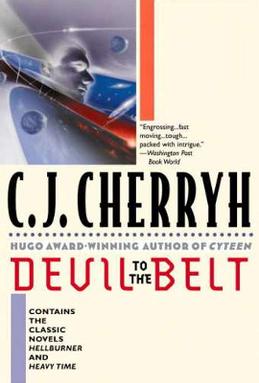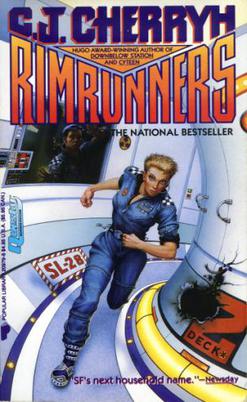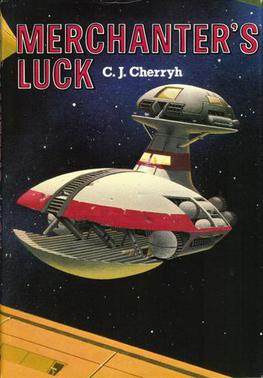1. A few months back, a friend and I lamented our agreeing perception of bad quality military science fiction today. We also reminisced on some of the big points in the genre: War of the Worlds, Starship Troopers, and The Forever War. This novel by CJ Cherryh is also military science fiction: four characters being trained in a program involving a specific spaceship that is difficult to fly, the program is failing, and political and fleet maneuvering try to save it from failing or hurry it on its way. Like Cherryh typically does, this is a novel based on interpersonal interactions first, political maneuvering second, and damaged people trying to find their way. So if you’re looking for military science fiction with depth, try here. There isn’t a stitch of combat until the end, but that ends up just being a test run. I do not think you need to read the prequel, Heavy Time, to understand this sequel or the characters, but Cherryh advises that you do.
2. There are five main characters in the novel: Meg, Sal, Ben, Dek, and Graff. And all of them change significantly throughout the novel.
—Graff sort of runs the show—that “sort of” taking up a bunch of the plot. He’s constantly uneasy at absentee management and that his direct superior in the program is not a part of his branch of the military. At the beginning he is sure of himself, but that’s quickly destroyed. By the end, as the scope of his influence spreads, and more importantly, as he realizes that it spreads in some ways and contracts in others, he is much more comfortable and effective in a wider variety of situations. For instance, the Graff at the beginning would not have been able to be so smooth in the press conferences at the end. He has changed throughout the novel to reflect the influences he comes under within the novel.
—Dek, recovering from an assassination attempt and heavily drugged up at the beginning, slowly gets his feet under him and learns to filter things out better. This is an ongoing process for him: coming to terms with the death of his team and their replacements, who are from an earlier point in his life he has cut off. By the end, he’s able to accept simple luxuries because he finally believes in himself.
—Ben begins by running away from hands-on work, believing he’ll be happier in some lab somewhere in Stockholm. But the fleet co-opts him and he finds uses for his skills that help his friends. He goes from an asshole who needs nobody to a man who comes to rely upon his friends deeply, and justifies their relying upon him as well.
—Sal is the one who doesn’t change much within this novel. She changes from the last novel to this one, but most of her change was in the prior novel, and this one helps solidify those changes in her. However, off-screen, between the novels, Sal’s greatest change occurs. At the end of Heavy Time she became a Shepherd, her goal. But eventually, between the novels, she realizes that Meg is more important to her by now, so she follows Meg into this novel. Coming to terms with this change in her is her story arc.
—Meg begins by being the egotistical, slighted political reformer and pilot. But through the training program, realizing her own age, the social situations on the station, and Sal’s kindness in coming with her—she eventually comes to a stable, happy place in her life. Some of that anger burns out, some she discards, the useful anger she keeps. And she becomes the first at something, proves herself to herself, echoing Dek’s journey but with specific points that are unique to Meg.
—These changing characters are the central focus of the novel. The plot supports their changing throughout.
3. And these changes are the theme here. By their changing and growing understanding of each other, the whole war effort is benefited through the program they save. In other words, improve yourself and many of those around you will also improve; find a place to fit in and don’t be surprised when you need to change to fit it too; and find a way to fit your situations without betraying your self. Tanzer’s method of leadership—anger and regulations—doesn’t fit who he has under him, and so he fails. Porey’s method of threats and grace in equal measures also don’t succeed. But this group of five people who ignore the chaff to learn to work with each other through understanding and kindness end up saving the whole program from ruin—and themselves in the process. This theme of communication leading to understanding leading to discussion leading to success is central and there are many, many smaller examples of this: Keu almost loses Graff’s efficacy through Keu’s lack of communication, but Saito and Demas pull him back; the first communication between Dek and his mother ends up averting a major political situation and more riots; Rob communicating a simple handshake to Dek helps diffuse a powderkeg; etc.
4. Again and again Cherryh changes her writing to fit the plot and characters of her novels, like she does here. This is a military training facility with military characters, and it reflects that. A lot less situations are gray areas while a lot more end up being black and white. Chain of command, word choices, training, regulations, gratuitous language—these all fundamentally change Cherryh’s writing. Meg and Sal, as they acclimate to the situation, are less flashy and more military by the end, and this change spread throughout helps set the tone of the novel. This tactic is incredibly effective at world building and drawing the reader into the novel.
5. And really, I don’t know what else to say. This novel is fantastic. There is no intro-info-dump, no last page reveal, no slow start, no wasted scene or word, no extraneous character, and no hint of deus ex machina. But of course it isn't just some list of how she writes: it's what she writes. This list just indicates which tactics she uses and which she avoids, indicates how much she respects the reader's intelligence rather than spoon feeding them, indicates the craft of her writing. The writing could pay a little more attention to description, but the payoff in world building with Cherryh’s tight voice is certainly worth that niggling lack. And the description of the ship from Meg’s eyes is wonderful. This is clearly one of her better works and, despite what she says, I think it does stand well on its own and can be read without first reading Heavy Time—though that’s not to say that Heavy Time is bad. This is a novel first, and a sequel second—which I couldn’t say about Regenesis. So far, I think it’s one of her best.
“The enemy of my enemy,” Demas said, and took the bottle up, “threatens both our livelihoods.”































.jpg/640px-Mirage_Aquarium_(8226785671).jpg)

.jpg/374px-Konrad_Kyeser%2C_Bellifortis%2C_Clm_30150%2C_Tafel_02%2C_Blatt_02v_(Ausschnitt).jpg)


